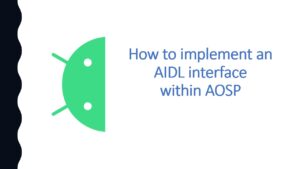Inter-process communication (IPC) is essential for sharing data or invoking methods between separate processes in Android. Android provides various mechanisms for IPC, including AIDL, Intent, and Messenger. Each method has its own set of advantages and disadvantages, which makes it crucial to understand the requirements and compare the available options. In this article, we will delve into the technical aspects of these IPC communication methods and discuss their pros and cons.
AIDL (Android Interface Definition Language)
AIDL is a powerful IPC communication mechanism that offers the following features:
- Two-way communication
- Ability to call a method directly from the remote process, making it suitable for sharing data or invoking methods from another process
- SELinux protection for priv-app and system app
- Security for Android apps through the definition of required permissions and additional protection by signing with the same key
Pros of using AIDL:
- Offers a robust solution for two-way communication
- Provides direct method invocation for the remote process
- Ensures security through SELinux and app permissions
Cons of using AIDL:
- More complex to implement compared to other IPC mechanisms
Messenger
Messenger is another IPC communication mechanism with the following characteristics:
- Two-way communication
- Non-concurrent operation
- Built as a simple wrapper around a Binder, with the underlying IBinder used by the Messenger
Pros of using Messenger:
- Easier to implement than AIDL
- Supports two-way communication
Cons of using Messenger:
- Non-concurrent operation, which may limit its use in certain scenarios
- Not as feature-rich as AIDL
Intent
Intent is an IPC communication mechanism that is easy to implement and offers the following features:
- One-way communication with support for data results from the target app through ResultReceiver
- Protection through app permissions, with the option to add extra security by signing with the same key
Pros of using Intent:
- Simple implementation process
- Secure through app permissions and signing with the same key
Cons of using Intent:
- Limited to one-way communication, which may not be suitable for all use cases
Conclusion
AIDL, Messenger, and Intent each have their own performance, security, and complexity trade-offs. AIDL provides a feature-rich solution with robust performance and security but requires more complex implementation. Messenger offers a simpler implementation process and adequate security but lacks concurrency and some features provided by AIDL. Intent is the easiest to implement, with reasonable security, but only supports one-way communication. Evaluating these aspects for each IPC communication method will help you determine the most appropriate mechanism for your Android app’s needs.



